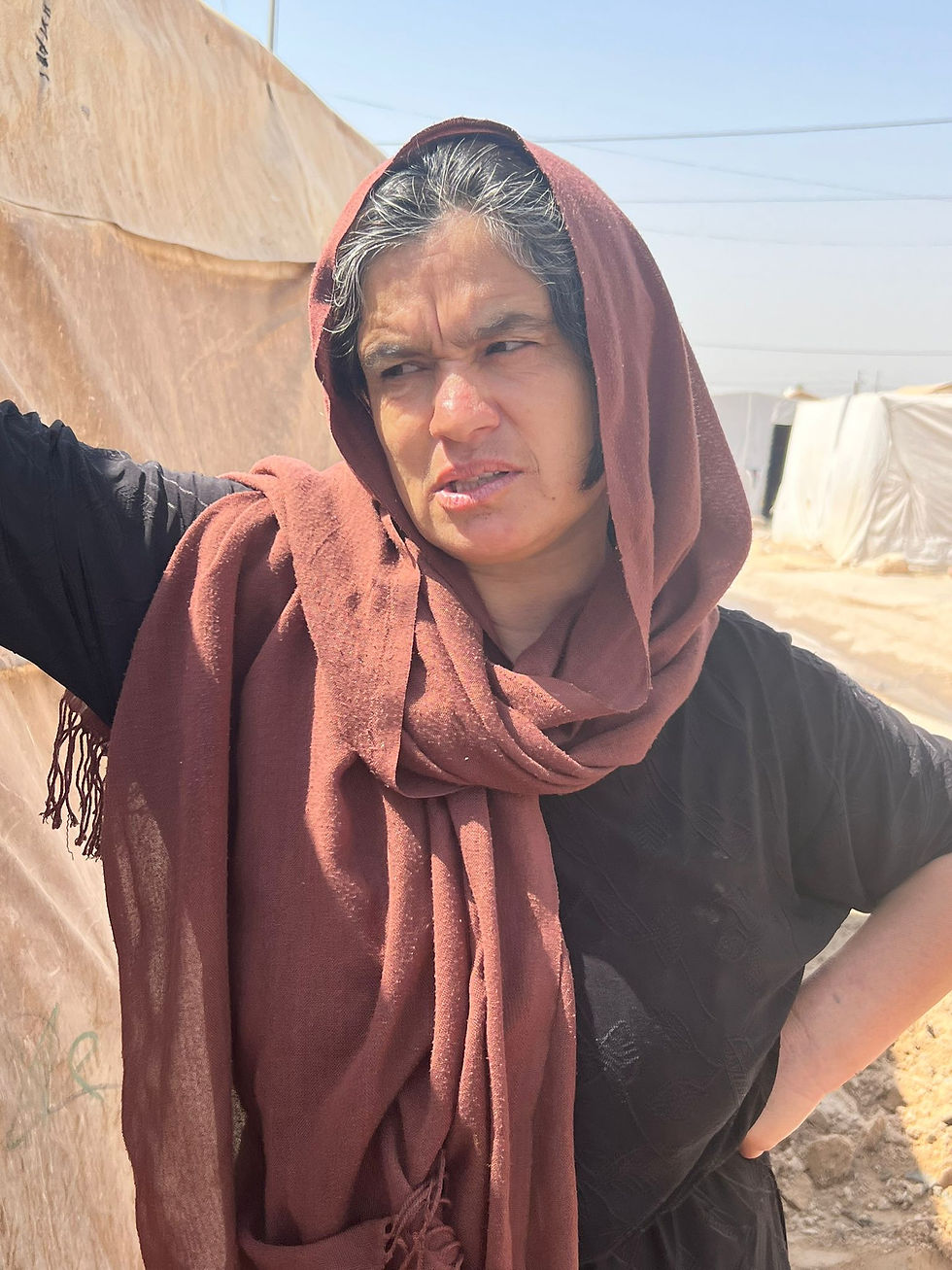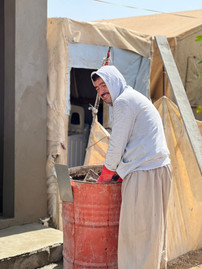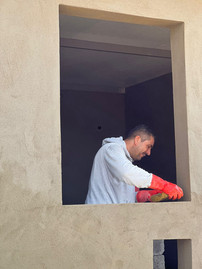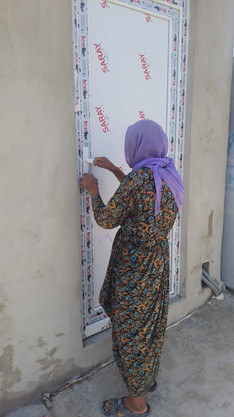Administering Justice
- springsofhope

- Aug 29, 2022
- 5 min read

“And David was greatly distressed, for the people spoke of stoning him, because the soul of all the people was grieved.” 1 Samuel 30.6
“But I am only a little child and do not know how to carry out my duties. So give your servant a discerning heart, to govern, to distinguish between right and wrong. …discernment in administering justice.” 1 Kings 3
These verses have gone before me, and behind me and carried me this week. “The soul of all the people was grieved.” Heavy words, words which reflect the mood inside Shariya Camp, a mood that is like a dry field that could go up in unquenchable flames at any given moment.
Ancient words that perfectly describe another ancient wound, a wound that like an infected injury is now oozing puss. I feel that we are standing at the juncture of one of the most critical and pivotal times in these eight years of the Yezidi genocide, captivity and displacement. A point and place in time that will determine the future of this bleeding community and will be to a large measure determined by the right or wrong administration of what should be restorative justice.
Several friends have texted me this week with comments such as “there must be great excitement in the camp as new homes are being built” or “people must be so happy”. I have not known how to respond because no, there is no excitement, there is no joy.
The heat is wearisome, 44-46c, many are closed inside the sandy tents as it is virtually impossible to function until 6pm. Their grievance is zipped inside their souls as are the tent doors against the heat. Those who are outside, do not greet us as once they would have, when we move around our various building sites. We are met with in your face open hostility, we have been sworn at, some of my staff told me that they have heard swear words they did not know existed. We have gone in and out in stealth hoping that we would not be seen, keeping our heads down and conversation to a minimum. The soul of the people is so deeply grieved.
The silence is not one of peace, it is a temporary cover for anger, frustration, disappointment, fear and jealousy. No one dares speak a word as the homes we are building are for those who survived ISIS. The silence is a cover that is about to explode, hence we are still restricted, and can not share anything on social media.
A can of worms has been opened. We have needed (and will continue to need) discernment in administering justice. Our gate has seen a continual stream of people carrying files and papers saying that they are Genocide Survivors. We check the government lists, their names appear, giving them the “governmental right” to be prioritised in the receiving of a new house. Their certificates say that they were in captivity for four days, ten days. I decided to ask them questions about their captivity. One woman told me that she did not know where she was held captive or for how long, and showed me a clip of an ISIS captor, swearing that she was the woman sitting in the corner of the room. One lady was trapped, with hundreds of others, on Sinjar Mountain for two weeks. Outside her tent are two new $60,000 pickup trucks, her sons all have businesses in the village, yet she demands that we build her a house. There is a steady flow of men in their mid twenties who were on the mountain for a few days but not taken into captivity and whose family are intact. There are those who give stories, show their certificate, some get onto our list until we hear from their neighbors whom we have known for eight years, that their story is somewhat fabricated. We have to stop, and dig deep to verify or nullify the given “facts”. Building Hope, Administering Justice is hard. Administering justice requires wisdom, compassion, discernment and doing that which is right, not being swayed by voices, tears or threats.
We are not the government, and on our list are those who were in captivity in Syria for five years, whose husbands and children are still unaccounted for. Those who have taken in their nieces and nephews raising them as their own. The grandmothers who are now homemakers for their grandchildren who returned broken from captivity. Those who did not ask us for a home, those who waited in hope.


Heated discussions have been heard in our office, between our staff, those from the village and those from Shingal. Arguments such as “the suffering of a girl who was taken into captivity, raped and escaped after two weeks is greater than a girl who became acclimatised and embraced the Daeshi life style for seven years prior to her rescue.” Or, “if all these people were trapped on the mountain but not taken into captivity, not in Iraq or Syria, then we have to question the genocide statistics.” The buried grievance of soul is surfacing.
Subjects that we have not entered into once in eight years and are now laid bare on our office table. Prior to Building Hope, all were equal in genocide, except now they are not, or are they? Does equality depend upon truth or finance?
In my decision making process of administering justice with wisdom and righteousness, I am fast learning the difference between the applications of Biblical justice which is both restorative and punitive, and that pertaining to social justice. Leviticus 19:15 tells us to judge our neighbour in righteousness. That would be with what is termed, restorative justice, whereby all those who were unrightfully hurt or wronged are restored and that which was taken from them is returned. This justice promotes unity and healing for both individuals and community.
The Biblical scholar Craig Blomberg wrote, “The Bible suggests a sharp critique of 1) statism that disregards the precious treasure of personal rootage and 2) the untrammelled individualism which secures individuals at the expense of the community. Out of the love of God and love of neighbour, the tsaddik (righteous) are willing to disadvantage themselves to advantage the community, and the wicked are willing to disadvantage the community to advantage themselves.”
When the soul of a people is grieved, one rarely sees the love of God or of one’s neighbor in practice and the application of Biblical justice is lost in the moment where the immediate application of a social justice is demanded.
We have not yet had the opportunity to rejoice with those who are quietly rejoicing over their new homes but it will come. Despite all the difficulties and opposition that we have faced, we have not slackened or lost our momentum, we have now completed 21 homes, are taking a weekend break, and on Sunday will commence 2 more.
There are wonderful stories to be shared, and when the time is right, when there is more freedom, we will share. One precious lady told us, “You rescued us from ISIS and you have continued to rescue us from many situations during the past years, I knew that when it was the right time you would rescue us from the tent.” Another who said “Although the window and door will come tomorrow I am already sitting inside my new home, dreaming of how cosy it will be this winter” Stories that have enabled our heart to smile as our souls have grieved this week.
I quote from an email that a friend sent yesterday “This is a moment of giving up hope and creating new hope. Giving up hope to return one day to the village you had and the life you once had, and starting a new hope of building a city beginning with two homes a day.”
It is to that city I look.







































Tears and prayers xx